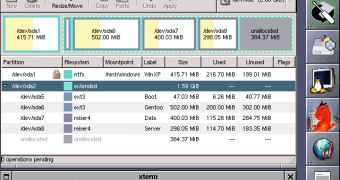SystemRescueCd, the popular Gentoo-based Linux distribution for disk partitioning and data rescue tasks, brings us an updated version, 1.0.2. Now, the default Linux kernel is 2.6.24.5, with Reiser4 support and much more goodies!
Here are the most important changes in SystemRescueCd 1.0.2:
? Enabled unicode by default ? Updated the default kernel to Linux-2.6.24.05 with Reiser4 ? Updated sys-block/partimage and sys-block/partimage-ssl to 0.6.7 ? Updated sys-fs/ntfs3g to 1.2412 (ntfs full read-write support) ? Added extra ntfsprogs tools (ntfswipe ntfstruncate ntfsmove ntfsmftalloc) ? Added x11-terms/rxvt-unicode (terminal that supports unicode) ? Added xfce-extra/terminal-0.2.8 (terminal with utf8 support and tabs) ? Added networking tools: openvpn + pptpclient + openswan + vpnc ? Added net-misc/autossh (automatically restart SSH sessions and tunnels) ? Rewrote the network boot options implementation (make it simpler) ? Improved the dhcp boot options support (pxeboot and dodhcp option) ? Added network boot options for static addresses on single interfaces ? Fixed boot from and hard disk connected to an HP-Smart-Array (CCISS) ? Added the server mode in TightVNC (vncpasswd + /etc/init.d/vnc start) ? Added the "vncserver=x:password" option (start vncserver with x displays) ? Added the "initscript=service:action" boot option to start/stop services ? Start the portmap initscript by default (required by autorun on nfs) ? Improved the vim configuration (turned on syntax highlighting) ? Added the missing net-dialup/rp-pppoe package (pppoe-setup command) ? Moved the initialization stuff from bashlogin to initscript ? Updated e2fsprogs to 1.40.8 (fix the wrong value for the inode size) ? Added several drivers for 56k modems
About SystemRescueCd:
SystemRescueCd is a Linux distribution that runs from a bootable CD (LiveCD) that is very useful for repairing your system and recovering data after a system crash. With it, you can create and edit partitions on your hard disks; it contains a large number of system utilities, such as partimage, parted, fstools, etc. Also, you will have tools for basic tasks, like text editors, midnight commander (file manager), and network tools. The Linux kernel supports the most important filesystems, like ext2/ext3, ReiserFS, Reiser4, XFS, etc. and network filesystems (SAMBA and NFS).
Download SystemRescueCd right now from Softpedia.

 14 DAY TRIAL //
14 DAY TRIAL //